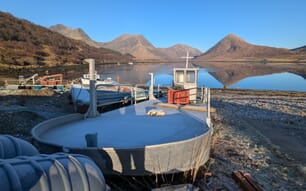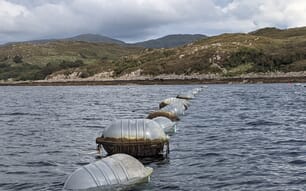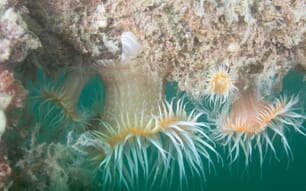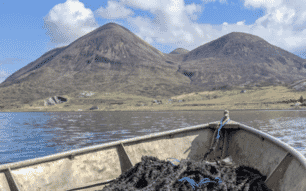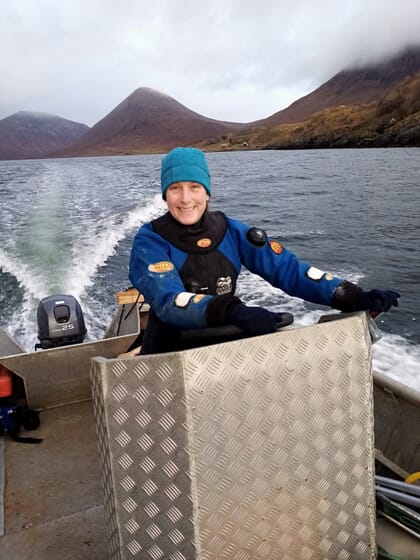
Being your own boss seems like a perfect scenario. Having always been employed – mostly by governments in islands scattered throughout the South Atlantic, doing commercial fisheries and marine conservation work – the chance to establish our own company seemed like an ideal opportunity.
Having returned to university later in life to study a masters in sustainable aquaculture at Stirling's Institute of Aquaculture I learned all about mussel farming (on paper anyway) and having spent six years on the Falklands Islands I wasn’t too worried about cold, wet windy weather! So, when we saw the Isle of Skye Mussel Company up for sale it seemed like it was a “now or never” moment. I’d never been to Skye, but my partner Andy [Airnes] assured me it was fabulous, and so we went all in and took on the company.
Owning your own business can sometimes feel like a continuous line of challenges and often more like one-step-forward-two-back than the other way round. But each challenge has also come with discoveries both of our own abilities and of the kindness and humanity of others – both strangers and close friends. From a local fisherman who rescued our telehandler when it broke down as we launched the boat during with an incoming tide, to neighbours lending us equipment (eg an auto bilge pump), to the previous owner offering helpful advice, to mention but a few, we have felt welcomed into the Skye community.
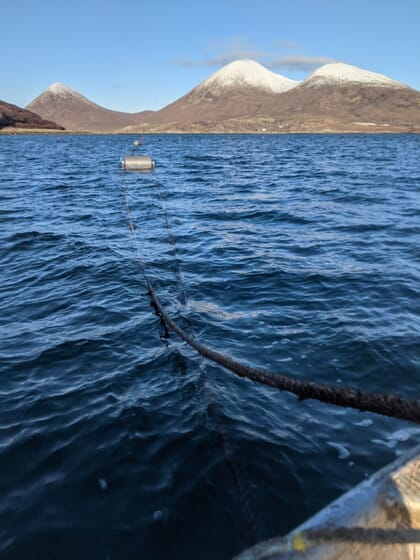
One of the bonuses of taking on a business when you’re a little older, and having travelled and worked in many places, is we’d made some extremely good friends along the way who all just happen to have some very useful talents! My good friend and artist Leighann Wolfaardt took on the challenge of our logo. We wanted something quite specific – something that showed the sustainability of rope-grown mussel culture – and she did a great job: the clear blue background representing the Grade A waters of the Scottish lochs where our sites are located, and the kelp on the line representing the biodiversity that mussel farming brings to sites, and of course mussels on ropes looking like you’d want to eat them!
A school friend has her own small business accounting firm (BlackBlaze bookkeeping) and she’s made sure we’re keeping all the right records and our spreadsheets are in order. And a friend who I first learned to dive with as a 14-year-old has been unbelievable in everything from helping us learn to service the boat engine, to loaning of equipment, to locating the sites (all the header lines had been left on the seabed).
We were warmly welcomed into the mussel farming world, not seen as competitors but shown such generosity by others willing to share their knowledge and experience. A trip to the Cromarty Firth and we met Andrew Jones, who showed us his site and the plentiful and healthy-looking spat hanging from the ropes. He talked us through his screw anchoring system and showed us how his production ropes are all set up. It was inspiring to see how far he’d come in only four years and his boundless enthusiasm was contagious. We were also lucky to get a day at Fassfern, where we went out with the Byrne brothers, Alan and Lawrie, whose depth of knowledge from 30 years in the business was invaluable – from the best knots and rope to use, to why some floats are better than others. Spending a day harvesting with them and watching them work seamlessly together was heart-warming, though I did have a bit of boat envy.
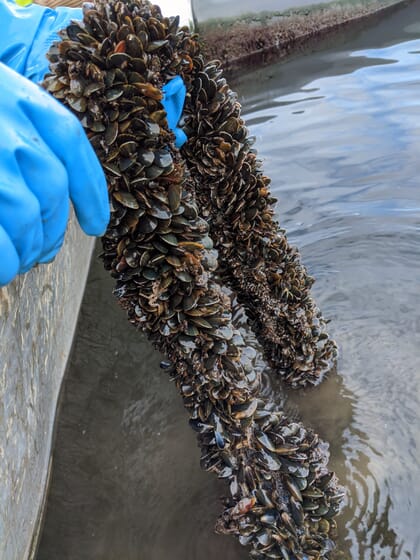
Setting up a new business is way more complicated though than just learning how to farm mussels. You have to be a grant writer, a social media whizz, a website designer, an accountant, a networker and a salesman. There’s a wealth of assistance out there though to steer you through this all and I’ve been attending webinars from Business Gateway on digital marketing, websites and social media for businesses. One of the biggest challenges for the mussel sector is growing the market, especially within the UK and we’re really keen to promote mussels as the healthy, nutritious, organic, sustainable food that they are. I just have to figure out how this technical thingamajig app does what I want it too! At least I have a few years to gain “followers” and get this fine-tuned – but the more we can do now the more streamlined our advertising will be when the mussels are ready.
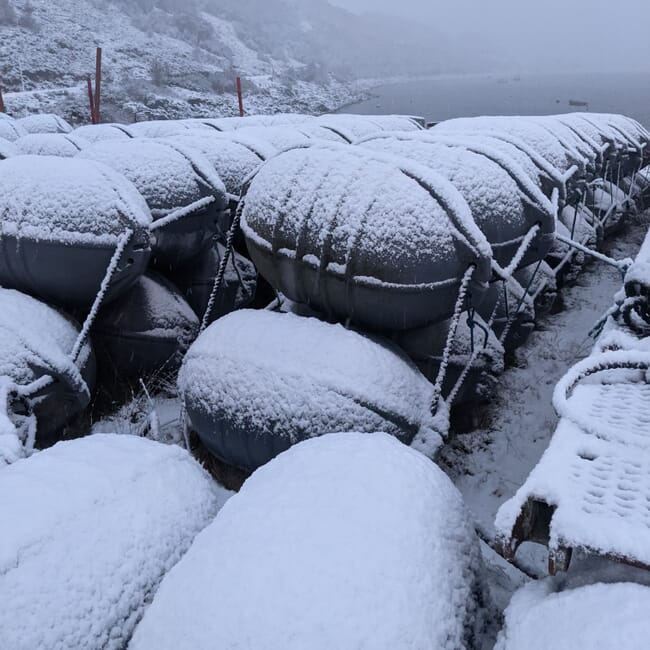
We’d been hoping to attend the annual Association of Scottish Shellfish Growers (ASSG) event in October but, as with many things, it was cancelled due to Covid-related restrictions. Being a new entrant to a sector and networking proves very difficult when you can’t attend such events, however one benefit has been the ability to join online events that perhaps would not have been possible to attend in person. Nick Lake of ASSG and Janet Brown (who I’d met through university) of The Grower have both really helped us feel part of the shellfish community, and joining the SAIC (Scottish Aquaculture Innovation Centre) consortium has also helped with virtual networking.
The mussel farm includes three sites in lochs on Skye, all had been fallowed for four years as the owners had retired. This presented the first challenge – getting everything up and running again. It’s hard to make firm plans when you don’t even know what gear you have and what condition it’s in. So, first job was to locate the header ropes on the seabed, check the mooring lines and anchors and start trying to get the header ropes to the surface and attach floats. We’re making inroads but have a long way to go yet – and there’s a lot of untangling of dropper ropes ahead of us to see how much is still useable.
The sites previously used the traditional dropper-and-peg system and, while we plan to use this method on a few ropes, we have also bought second-hand continuous line (the New Zealand method) so that we can compare the two systems in terms of yield and ease of production. We’re keen to ensure we use the most environmentally friendly and efficient method as we aim to achieve organic certification before we start harvesting.
It’s a way off yet but we’re also starting to think about potential customers and products and are keen to eventually develop our own value-added products. Getting the sites up to full capacity and diversifying the products will also mean the creation of local employment. Even during the 2020 summer I saw many a tourist enjoying the wonders of this rugged island. And what better way to end a day of hill walking or sightseeing than to enjoy the delicacies from the local lochs, fresh rope-grown mussels served alongside other local Skye produce. Christmas brought three mussel cook books so we’ve plenty of inspirational cheffing to try, using Scottish Shellfish Marketing Group mussels until we can sample our own.
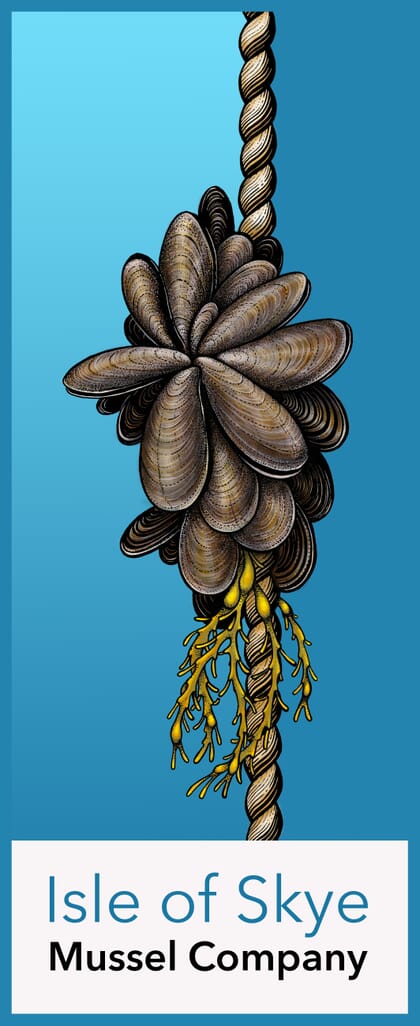
The learning curve is steep and we’ve a long, long way to go. 2020 wasn’t the easiest year to start a new business, with many grants gone due to Brexit or diverted to established farms rather than start-ups. And juggling the mussel farm work with jobs, as we need the income while the mussels are growing, puts pressure on time and chasing the good weather days when not doing the day job.
However, we’re hopeful to have lines ready for spat collection this spring in Loch Slapin and Loch Eishort. Everyone says every site is different and it takes a few years to get to know what the challenges are at each location, so this first year will be a lot of trial and error we’re sure. But every day when we wake to the mountains and lochs of Skye, or when we return from a day at the site seeing the accomplishments of the day, there is a sense of purpose and we’re happy to have made this lifestyle choice. Let the hard work begin!
Follow us on Instagram or Facebook – Isleofskyemusselcompany for regular progress updates

